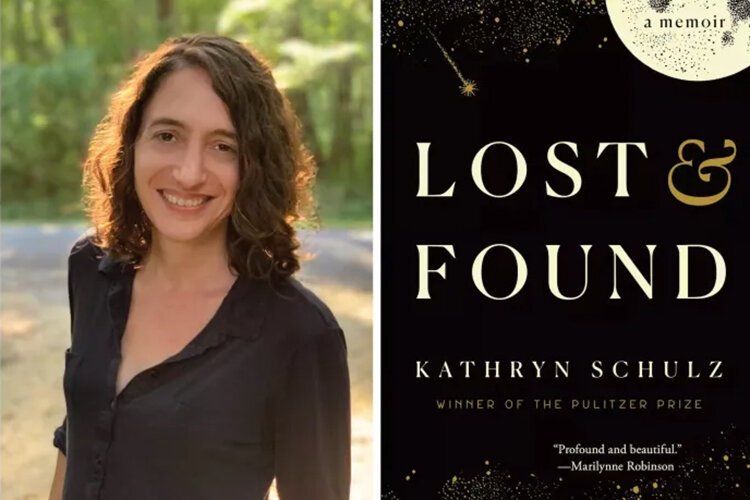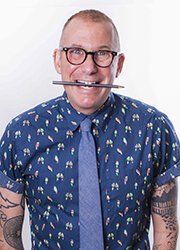A Pulitzer Prize-winning Shaker native and her unforgettable memoir of all things Lost & Found
 Casey Cep | Courtesy photo from Penguin Random HouseKathryn Schulz
Casey Cep | Courtesy photo from Penguin Random HouseKathryn Schulz
What connects losing your car keys, finding the love of your life, combing the ocean for a fallen plane, and the death of a beloved parent?
The answer is “Lost & Found,” a national bestseller by author and Shaker Heights native Kathryn Schulz.
In this no-holds-barred memoir, Schulz—a Pulitzer Prize-winning staff writer at “The New Yorker”—gives the reader unfettered access to the pivotal life experience of the death of her father and the equally momentous encountering of the love who would become her wife.
Something pivotal lost. Something pivotal found.
In between, Schulz leads us through a powerful meditation on how disappearance and discovery affect everything from the mundane lost post-it note to the powerful finding of great fortune.
“The Buckeye Flame” editor Ken Schneck spoke with Schulz to get her thoughts on her Shaker Heights upbringing, life married to another writer (fellow bestselling author Casey Cep) and how advice from a running coach can make you a better writer.
When little you were running around Shaker Heights as a child, was writing always the dream?
To tell you the truth, it actually was. I can’t remember a time when I didn’t love to write. As a kid, I was an absolute bookworm: loved to read and loved to write.
I think back then I had the really mistaken notion that I would write fiction, which I turned out to be absolutely terrible at. So, it’s a great mercy for the world that I did not pursue that dream. But yes, I’ve always really loved to write.
Let’s get right into “Lost & Found.” You go pretty deep—from the loss of your father to the finding of your wife. Was there a point during all of those big life experiences when you said, “I have to write about all of this!”?
For many years before my father died, I had been toying with writing an essay about losing things.
Losing things is a weird category. We lose a really strange range of things from our car keys to our loved ones and all kinds of things in between. But it never really worked as an essay.
The truth is—and maybe this will make me sound like some kind of monster—as my father was dying and I found myself gravitating towards this language of loss to describe grief, I realized right away why I hadn’t been able to write that essay. It just didn’t have the right emotional stakes.
I thought this might be the way to eulogize my dad. As it happens, he himself embodied the whole spectrum of loss, not only because I lost him and was grieving him, but because he was this fabulously absentminded professor-type who couldn’t hold on to his car keys to save his life. But then he had this deep history of really sweeping and enormous losses.
I read the book on a plane ride back to Cleveland from Belize, finished the book right before I landed back in Ohio, got home, and promptly lost my keys.
Oh no! It’s like a curse!
And I wanted to just look for them, but because of your book, my brain was also processing the psychology of losing things. Do you feel bad that I couldn’t just look for my keys and instead had to process loss on so many different layers because of your words?
I personally cast a spell on every single copy of the book that the person will lose something.
And then when I found my keys, I went through that psychology of finding things too!
[laughs] It’s actually really nice to know that reading the book affected your experience and added to your thought processes.
It did! Which begs the question: when people close the book, what do you want them walking away with?
I guess I have two answers. One is selfish and one is less selfish. The selfish answer is that I’ve been writing long enough to know I can’t please all the readers all the time. But I hope people love the two main characters. This is absolutely a love letter to my father and to my partner. I hope it comes across how happy I am to have met these two.
The less selfish reaction is that I hope people finish this book with a real sense of gratitude. I think that’s really one of the primary emotions that inspired me to write it…this feeling of just being amazed and thankful, despite life’s difficulties and fragility and transience. It’s incredible to be here and love one another and experience each other and really just experience the world. It really is that conjoined sense of awe and gratitude that I feel very deeply and want to transmit in these pages. I hope that comes through.
How much does Ohio factor into who you are as a writer?
That’s such a great question. I suppose Ohio features into who I am as an everything. I’m very grateful for where I grew up. I’m very attached to Ohio. I do feel in some deep way Midwestern, the same way that in some deep, slightly indescribable way that I feel Jewish and am my father’s daughter and my mother’s daughter.
It’s interesting to think about it from a writerly way. It’s not like, “Ah, yes, I’m following in the footsteps of Sherwood Anderson.” [laughs]It’s not so much that I feel like I’ve tapped into a literary genealogy that connects me to Ohio. But I certainly think Ohio is a deep part of who I am, so therefore in some ways—which I will leave to critics and to try to explain—Ohio can be found in my writing.
I cannot tell if it is my dream or my nightmare to marry another writer. What is the correct answer?
[laughs] In my case, it’s an absolute dream. My partner and I are really surprised and intrigued at how many people—when they learn we’re both writers—think that would be a nightmare.
I don’t exactly know what they’re channeling in those moments. Probably that writers are a stressed-out emotional bunch or that they’re a jealous bunch or keep crazy hours. But I can say with confidence from my perspective, it’s just amazingly great.
When you called, I was in the middle of reading the almost-final draft of a really tremendous piece my partner is working on. It’s so fun! I love being inside it with her. And I love that she can do that with me. She understands and can empathize with reporter problems, and structural problems and problems of “why doesn’t that sentence work?”
It’s so satisfying to have someone in there with me. Before we met, I actually was so stressed out and it’s so shocking to me how much that isn’t true anymore. And that’s part of my conversion to being a happy writer.
So, you recommend it? Because in my head, you two are hosting a nightly salon at 7:15 pm. That’s what I picture.
I highly recommend it. But at 7:15 p.m., I’m thinking, “Oh, it’s 15 minutes past the baby’s bedtime.” We could actually host a salon, but mostly we’re cleaning broccoli off the floor from the baby’s dinner and trying to decide if we should watch something on Netflix before doing a tiny bit of work and going to sleep.
But it is certainly the case that we have doubled each other’s writerly references. I went and read the writing that was most meaningful to her, and my bookshelves expanded. I met the writers in her life and she met the writers in mine and we met new one’s together.
Last question. For our queer Ohio writers trying to find their voice, what’s that patented Kathryn Schulz advice they can take with them?
The last question is, of course, the hardest. I will just say that everyone has their own voice and has to work to figure out what that is and how to use it in the world. But I have to repeat that obvious thing that everyone says: the only way to get better at it is to just keep doing it.
The best advice I was ever given about everything in life was not about writing. It was about running.
I once met this running coach, and I was talking to him about my frustrations at not being able to break out of a clockwork pace. I was really struggling to get faster. He looked at me and said, “The way to run faster is to run faster.”
I think that’s just true about everything. The only way to run faster is to run faster. The only way to write is to write. There’s no secret. It’s about sitting down in a chair and working away at it. Sometimes that’s by actually writing something, sometimes that’s by reading something that’s really good, sometimes that’s by outlining. There’s no short-cut. You just have to write.
Originally published in “The Buckeye Flame” on Oct. 20. Republished with permission.

About the Author: Ken Schneck
Ken Schneck is the Editor of The Buckeye Flame, Ohio’s LGBTQ+ news and views digital platform. He is the author of Seriously…What Am I Doing Here? The Adventures of a Wondering and Wandering Gay Jew (2017), LGBTQ Cleveland (2018), LGBTQ Columbus (2019), and LGBTQ Cincinnati. For 10 years, he was the host of This Show is So Gay, the nationally-syndicated radio show. In his spare time, he is a Professor of Education at Baldwin Wallace University, teaching courses in ethical leadership, antiracism, and how individuals can work with communities to make just and meaningful change.
